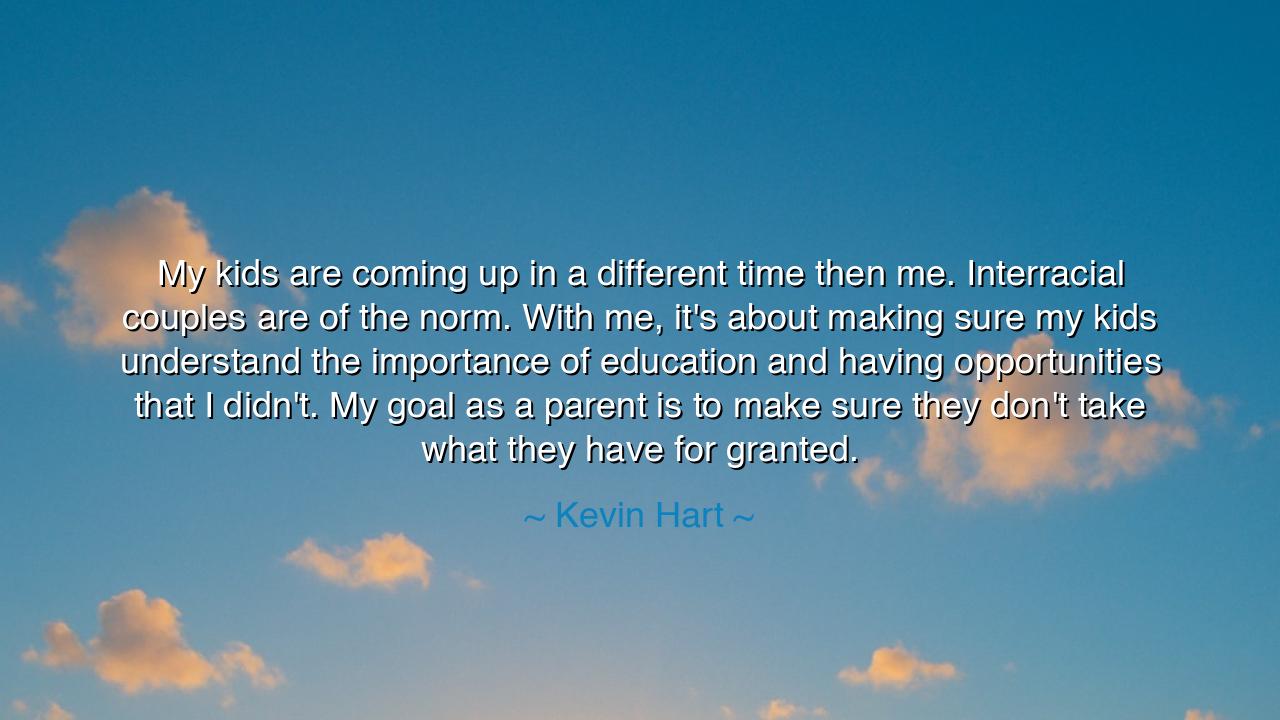
My kids are coming up in a different time then me. Interracial
My kids are coming up in a different time then me. Interracial couples are of the norm. With me, it's about making sure my kids understand the importance of education and having opportunities that I didn't. My goal as a parent is to make sure they don't take what they have for granted.






The words of Kevin Hart ring with both humility and wisdom: “My kids are coming up in a different time than me. Interracial couples are of the norm. With me, it's about making sure my kids understand the importance of education and having opportunities that I didn't. My goal as a parent is to make sure they don't take what they have for granted.” Beneath these simple words lies a deep and ancient truth—the unending duty of a parent to pass the torch of understanding, gratitude, and discipline to the next generation. Hart’s reflection is not merely about fame or fortune, but about legacy—the sacred bridge between what one has endured and what one hopes to leave behind.
He speaks as one who remembers struggle. Born into a world less tolerant, less open, Kevin Hart grew from hardship, from the cracked pavement of challenge and the laughter that blooms even in pain. He came from a time when diversity was questioned, when success was not given but wrestled for, when opportunities were narrow and guarded. But now, his children rise in a new age—one where doors stand open that were once sealed shut, where interracial love no longer draws stares but smiles, and where possibility seems endless. Yet Hart knows, as every wise parent does, that abundance without understanding leads to arrogance, and freedom without gratitude leads to decay.
His focus on education reveals the timeless law of progress: that knowledge is the true inheritance of the human spirit. Money fades, fame flickers, but wisdom endures. Hart understands that though his children may never know the pain of want, they must still learn the discipline of effort. For there is danger in ease. History shows us that when a generation inherits comfort without comprehension, it often forgets the price of its privilege. To guard against this, he seeks to teach them not only to learn, but to value learning—to see it as both gift and responsibility.
There is an echo here of an ancient pattern seen in every civilization. The first generation fights for survival; the second strives for success; the third must learn to preserve meaning. Consider the story of Marcus Aurelius, the philosopher-king of Rome. He too raised a son, Commodus, in a time of plenty. Marcus wrote his Meditations to remind himself of virtue, restraint, and service—but his son, born to luxury, ignored these lessons and led Rome toward decline. Kevin Hart’s words, spoken in the tone of a modern sage, bear the same warning: that each generation must teach the next not to take what they have for granted, lest the fire of gratitude die and darkness return.
His reflection on interracial love is no less profound. Where once color divided, now it blends into beauty. In this, Hart recognizes the evolution of humanity—the slow, painful awakening toward equality. His children are heirs to this progress, living proof that what was once forbidden has become celebrated. But he knows, too, that progress is fragile; understanding must be taught anew. For every generation, tolerance must not be inherited passively—it must be practiced deliberately. Freedom from prejudice is not a gift one receives; it is a mindset one nurtures.
There is something heroic in the humility of his purpose. Despite wealth, despite fame, Hart’s goal is not to make his children greater than him in fortune, but richer than him in gratitude. This is the mark of true fatherhood—the will to protect one’s offspring not from struggle itself, but from the ignorance of its necessity. He does not seek to shield them from the world, but to prepare them for it; not to fill their hands, but to strengthen their hearts. In this, Hart stands among all those parents, past and present, who measure success not by what they have achieved, but by what their children learn to honor.
The lesson of his words reaches beyond family—it is a mirror for all who live in times of abundance. Whether as parents, leaders, or citizens, we must remember that the blessings we enjoy were purchased by the sweat and sacrifice of others. To honor them, we must live with awareness, teach with discipline, and give with gratitude. The true wealth of a people is not in what they possess, but in what they remember.
So, let Hart’s wisdom be taken as a commandment of love: Teach your children where they come from, so they know where to go. Remind them that opportunity is sacred, that education is power, and that equality is a flame kept alive only by understanding. And above all, teach them to give thanks—not in words alone, but through effort, respect, and purpose. For the parent who does this leaves behind not riches, but a lineage of strength, humility, and light.






AAdministratorAdministrator
Welcome, honored guests. Please leave a comment, we will respond soon